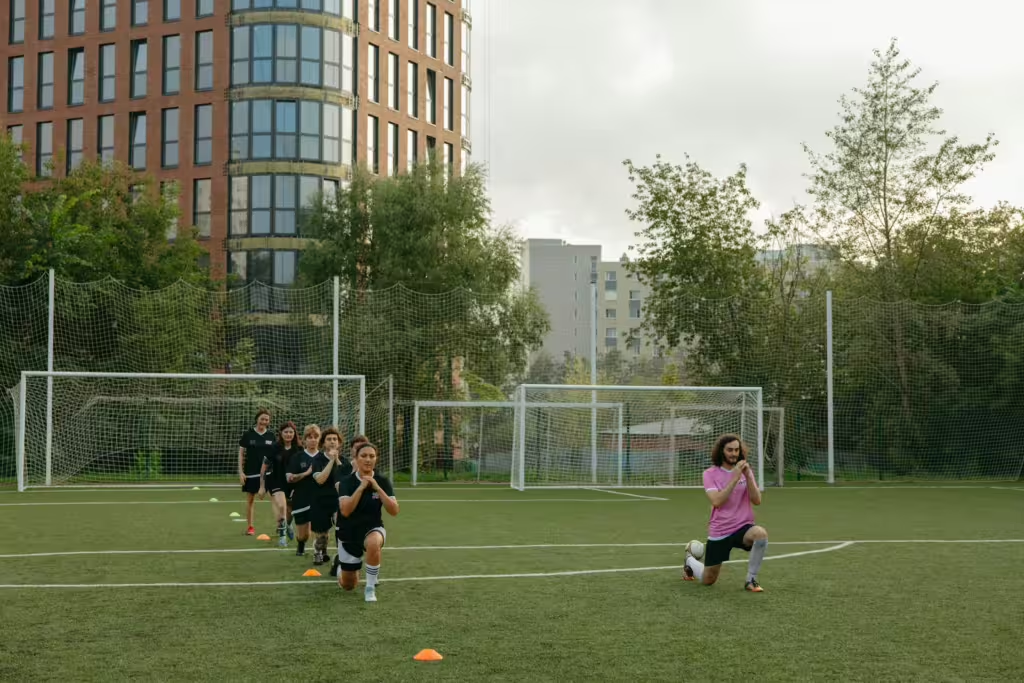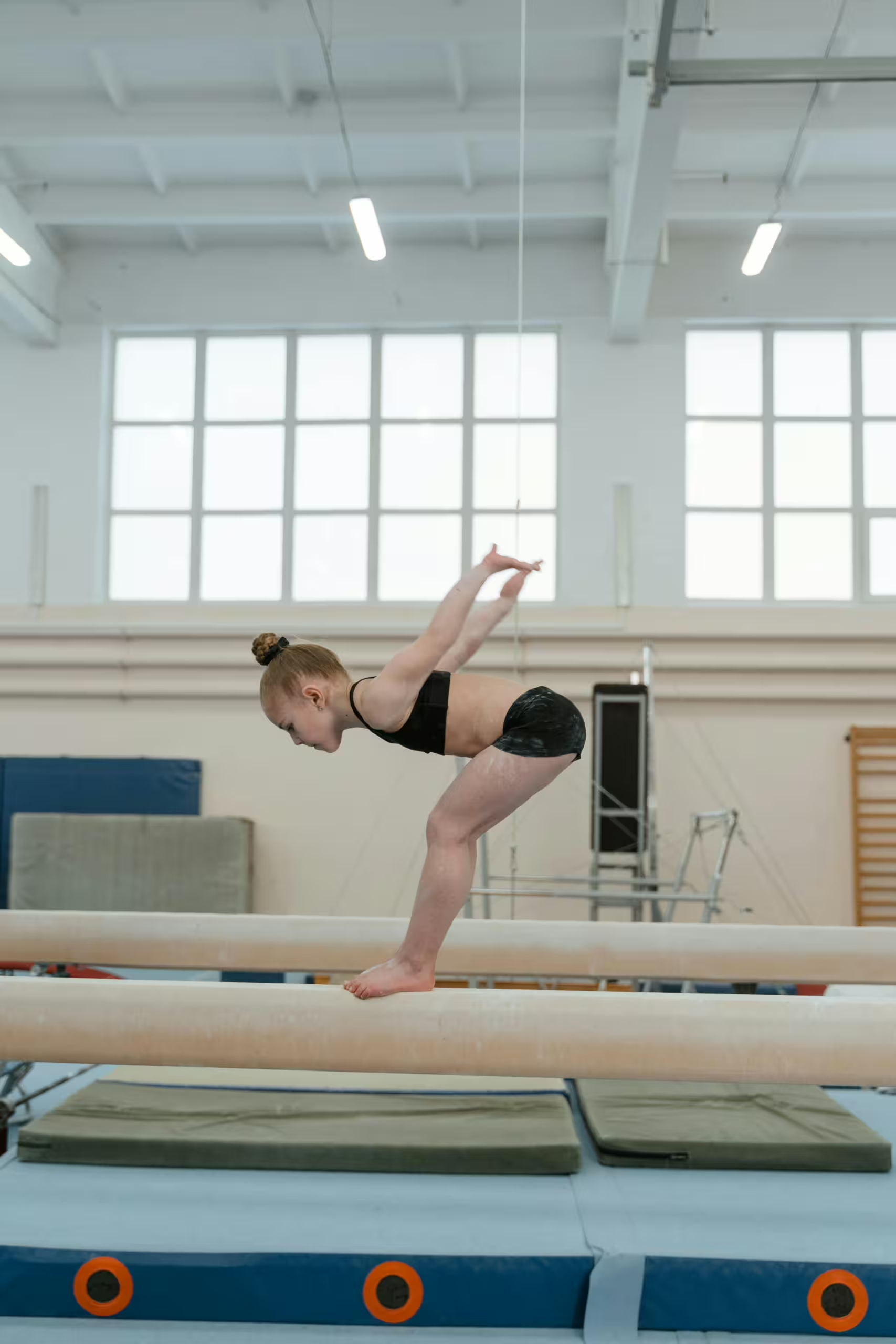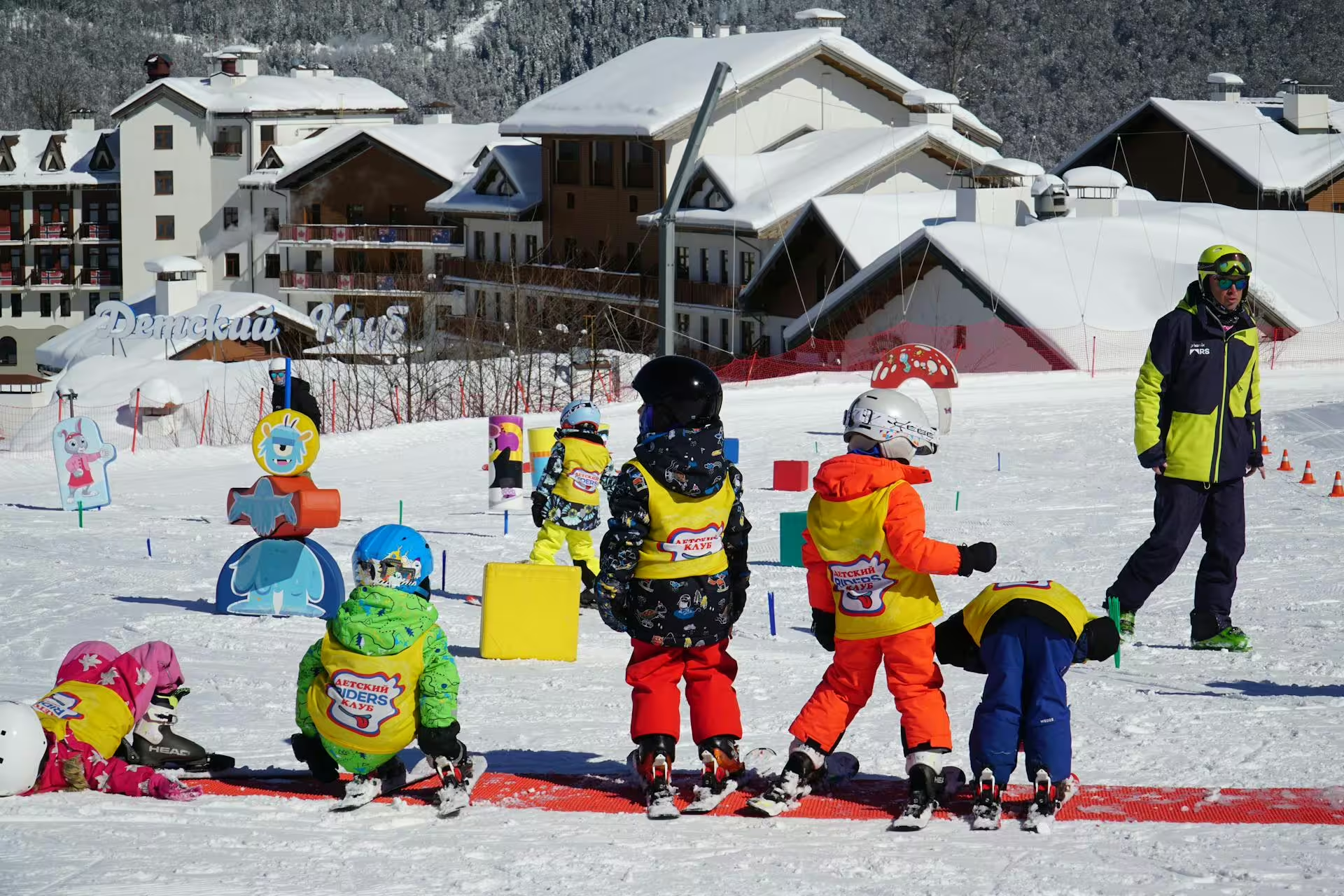Spring is here and the grass is becoming greener by the day. Perfectly manicured, green grass fields can only mean one thing; soccer season has finally arrived! Soccer is the world’s most popular sport — and for good reason. Soccer is a fast-paced, exciting, sport that is easy for kids of all ages to pick up without too much of a learning curve. Whether your child is scoring their first goal or the type to chase butterflies on the field instead, soccer offers each kid an incredible opportunity for fun, exercise, and personal growth.
For parents who might be new to the game, getting your child started in soccer can feel somewhat overwhelming. The uninitiated don’t know what age their child should begin, what type of league they should choose, what skills their child needs to develop, or how to make sure they are having fun, even when things get tough. That’s where Cultured Athlete coms in! We are here to help!
In this article, we will walk parents through everything they need to know. We will help parents introduce their children to soccer in a way that’s positive, supportive, and developmentally appropriate. Moreover, we will make it so that you, as parents, have the confidence to navigate their soccer journey alongside them, providing help and guidance along the way.
Why Soccer is a Great First Sport for Kids
Before we dive into how to get started, let’s talk about why soccer is a fantastic first sport for young kids and children of all ages:
Simple Rules: The concepts behind the sport are fairly basic. The main concept is — kick the ball into the goal — that’s it. Even the youngest players can understand that, surely.
Physical Fitness: Soccer involves a lot of running and maneuvering around other players, while manipulating the ball with primarily your feet and legs. As a result, kids who play soccer develop cardiovascular endurance, balance, coordination, and better motor skills.
Social Development: Soccer is a team sport so it promotes teamwork, communication, and making friends with one’s peers.
Affordability: Compared to many sports, even dance (which is actually surprisingly expensive) soccer tends to have lower equipment and registration costs, on average.
Inclusivity: Anyone and everyone can play soccer, regardless of size, strength, skill, or speed; and any one of those attributes can be improved by playing and learning.
Global Appeal: As your child grows, they can become part of a worldwide community of soccer players and fans all across the globe!
In short, soccer provides children with a low-pressure, high-energy environment that helps kids fall in love with being active. As with many youth sports, this can provide your kid with a great foundation for a lifetime of health, fitness, friendship, and fun.
When to Start Soccer
Children as young as 3 can play soccer and many soccer leagues offer programs for kids between 3 and 5 years of age. These stages are often referred to as “Tiny Tots” or “Little Kickers” programs. However, the “right” time to start depends entirely on your child. Their personality, coordination, and interest level should all be taken into consideration when deciding whether or not to get them started.
Here are a few guidelines:
Ages 3-4: Little Kickers levels tend to focus is on fun, running, and very basic ball skills. Organized games are quite rare at this stage and activities are often more like soccer-themed games of tag or obstacle courses.
Ages 5-6: Once a kid gets a little older and they begin to understand soccer positions and simple rules, they can move up. Short games are introduced around now, but winning and losing are not always emphasized.
Ages 7-8: Kids around 7 and 8 years old can grasp team strategies and start developing real soccer skills like passing, dribbling, and shooting.
Ages 9 and Up: This tends to be when more competitive options become available, including travel teams and tournaments.
Tip: Don’t just rely on your own intuition. Follow your child’s lead. If they’re excited about playing soccer, that’s a great sign. If they seem hesitant or shy, try a “soccer basics” class before committing to a team, league, program, or an entire season.

How to Introduce Soccer to Young Kids
The goal when introducing soccer isn’t to create the next World Cup star…though that would be nice. Rather, it is to make the experience as fun and engaging as possible.
Here’s how you can help:
Start with Play, Not Pressure
Instead of diving into drills and formal teams right away, play informal games:
- Set up a goal in the backyard.
- Play keep-away games.
- Let your child dribble and chase the ball at their own pace.
The key here lies in unstructured, joyful movement.
Watch Soccer Together
It’s good to give your child an idea of how professional soccer players play the game. This is why we recommend that you expose your child to soccer culture by watching matches together. It doesn’t even have to be a professional game, it could be a local high school team game, or watching their cousins or siblings play games.
While watching, point out a few important aspects of the game, such as :
- Teamwork
- Great passes
- Good sportsmanship
Watching soccer is a great way build excitement and provide visual learning without formal instruction. It’s also an excellent way to connect with your child on something that you can enjoy together.
Get the Right-Sized Ball
Children ages 3 to 8 use a Size 3 soccer ball. This one is designed for younger kids because it’s smaller, lighter, and easier for little feet to control. Bigger balls can not only be more frustrating and unwieldy, they can even cause accidental injury.
Keep Equipment Simple
Kids who play soccer don’t need fancy gear right away. All they need to get started:
- Comfortable athletic shoes (cleats later)
- Shin guards
- A water bottle
- Optional: small pop-up goals for backyard play
Focus on comfort and safety when seeking out these contrivances, don’t worry about style or brand names.
Choosing the Right Soccer League or Team
Finding the right environment is going to be crucial for your child’s first soccer experience. If the coach isn’t right or the focus is too competitive, it might make things difficult or uncomfortable for your child. Here’s what parents should consider:
Look for Developmental Focus
For younger players, the emphasis should be on:
- Skills development
- Sportsmanship and Teamwork
- Having fun with other kids
Beware of any leagues that stress competition and winning for kids under 8. Those environments are not only realistic, they can be overwhelming and discouraging for kids who are just starting out.
Questions parents should ask potential soccer leagues:
- What is your coaching philosophy for young players?
- How often are practices and games for little kids?
- How are teams formed?
Consider Rec vs. Competitive Leagues
Recreational leagues: These are typically better for beginners. They are usually more focusd on fun, fundamentals, and friendship.
Competitive/travel leagues: These are a bit more of a higher commitment (more practices, travel, costs) and usually suited for older, more serious players.
Check Coach Credentials
Finding a great youth coach is one major part of the challenge. Bear in mind that a good kid’s soccer coach doesn’t just know soccer — they know kids, in general. Parents should seek out coaches who:
- Have experience with their child’s age group
- Prioritize positive reinforcement over successes and wins
- Communicate clearly with both players and parents about all aspects of the game.
Keep in mind that some leagues require background checks and coaching certifications, which is a good sign if you’re concerned about a particular coach. That said, go with your gut; if you’ve got a bad feeling about the coach, it might just mean you need to find another option.
Understand the Commitment
If you are seriously considering soccer for your child, there are a few things you need to keep in mind and be informed about to begin with. There are commitments on the parent’s part, as well as the child, that should be considered, including:
- Season length
- Game schedules
- Travel requirements
- Volunteer expectations (like snack duty or carpooling)
Make sure the time commitment fits your family’s schedule and your collective availability.
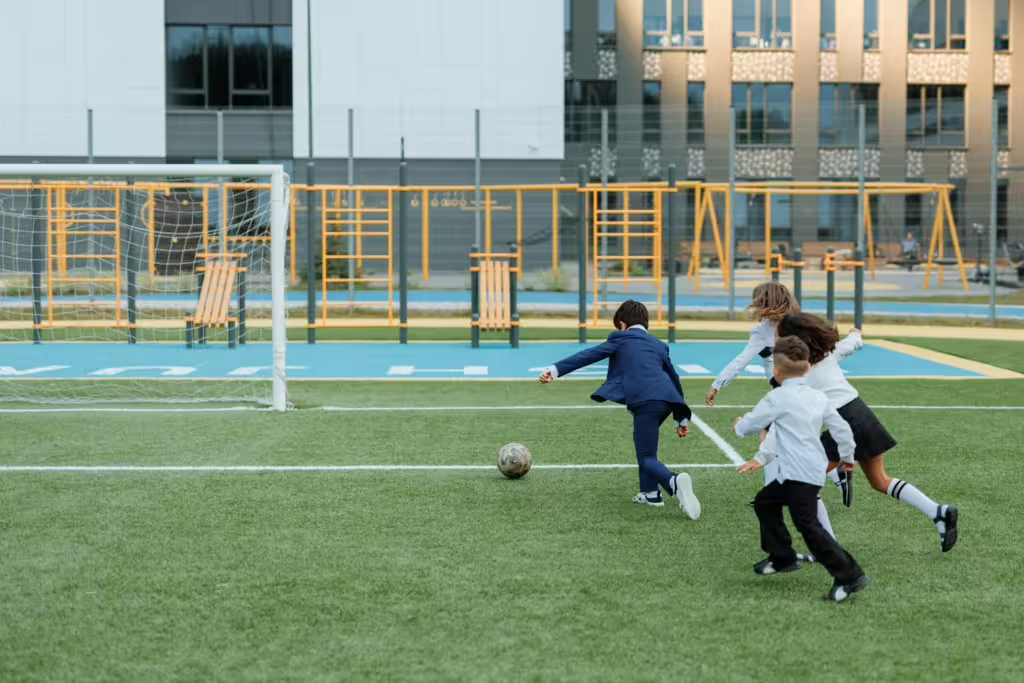
Supporting Your Child’s Soccer Journey
Once your child is signed up and ready to play the game, your role as a supportive parent is about to become even more important. Here’s how parents can help without adding any undue pressure.
Focus on Effort, Not Results
Parents should praise certain positive attribute such as hustle, attitude, and teamwork rather than the number of goals scored or number of games won.
Try using phrases like:
- “I loved how hard you ran today!”
- “You really worked well with your teammates.”
- “You kept trying even when it got tough — great job!”
These aren’t just canned phrases, they can help your child build internal motivation — meaning, they will play for the love of the game, not just to win some trophies.
Be the Encouraging Spectator
As a parent, most of the time our place is on the sidelines but that doesn’t mean we can’t do our part from that vantage! When you’re there, make sure that you:
- Cheer for everyone
- Stay positive, even after mistakes
- Avoid coaching from the stands
Remember, one voice matters, especially if it is their parent’s voice. As such, that voice should be supportive, encouraging, and proud at all times.
Let Coaches Coach
Parents need to do what they can to keep their nose out of the coach’s business. This means resisting the temptation to give detailed instructions during games or practices. Let the coaches do their job without unnecessary or intrusive input.
Your role as a parent is to:
- Provide emotional support
- Celebrate improvement
- Trust the process
Keep Perspective
Try and remember that every child develops at their own pace. Some will “get it” quickly; others will just need more time. If your child is the latter, be patient for them, because they won’t always be that patient with themselves. Remind yourself and your child that it’s okay to make mistakes. Remind them that improvement is the goal, perfection doesn’t have to be. Finally, remind them that having fun is what matters most. A positive parental attitude can help your child navigate their own frustrations with confidence.
Balancing Soccer with Life
One challenge that many families face in youth sports lies in balancing soccer with other aspects of life. School, family time, and other activities are important as well. Early specialization — focusing only on soccer year-round from a young age — is not necessary or even recommended for young kids.
Parents should encourage their child to:
- Play multiple sports
- Take breaks between seasons
- Maintain friendships outside of soccer
- Pursue other hobbies
A well-rounded child is a happier, healthier athlete.
Common Concerns — and How to Handle Them
What if My Child Wants to Quit?
First, listen to their concerns. Ask open-ended questions like:
- “What don’t you like about soccer right now?”
- “Is it practice, games, teammates, or something else?”
Sometimes all it takes is a small adjustment like a different team or less pressure. This can often rekindle a child’s interest in any sport, soccer included. If they truly aren’t enjoying it after giving it a real shot, it’s okay to move on to something different. Maybe soccer just isn’t for them and that’s ok. Sports should be a source of joy, not obligation.
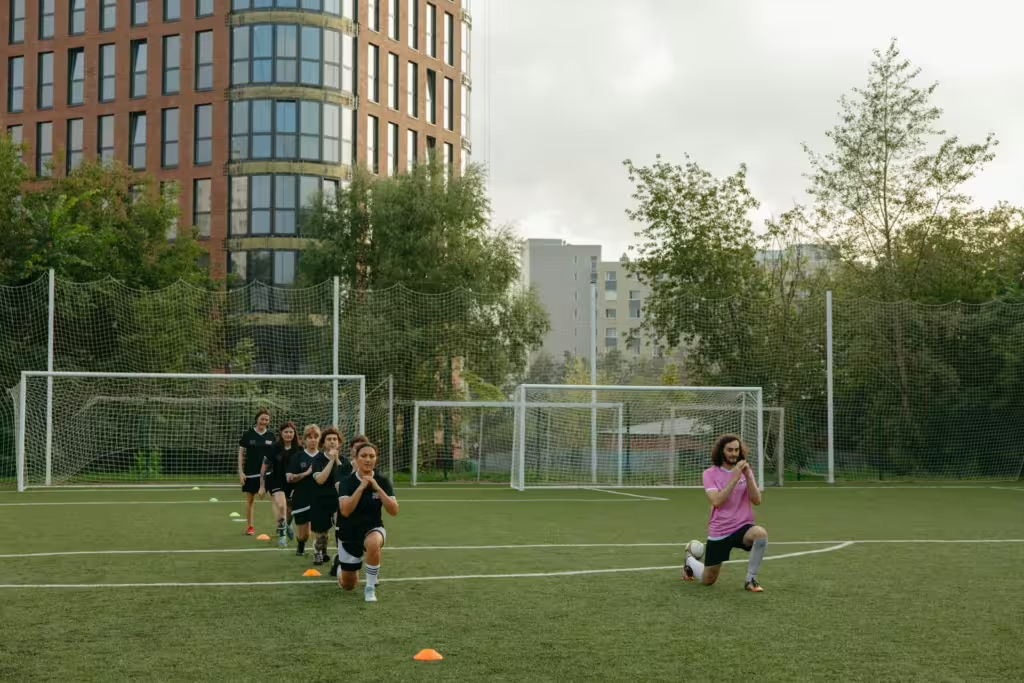
Cultured Athlete Says…
As you can see, soccer is more than a game for some kids, it is an opportunity that can help them build a lifelong love of sports. Kid’s soccer allows them to hone their physical skills, learn teamwork, build up perseverance, confidence, and resilience, and have fun. It will also help them learn to be good sports and take joy in the simple pleasure of playing sports with their friends.
In the end, it’s important to remember that this is their journey, not yours; some parents forget that, but this mistake is easily rectified. All you need to do is support them with enthusiasm, patience, and pride, and you’ll both enjoy every kick, pass, and goal along the way.
Discover more from CulturedAthlete
Subscribe to get the latest posts sent to your email.

